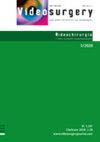The effect of application of a Soton ureteroscope on infection after flexible ureteroscopy lithotripsy
IF 1.9
4区 医学
Q2 SURGERY
引用次数: 2
Abstract
Introduction Postoperative infection is still one of the most common complications following flexible ureteroscopy lithotripsy (FURL). However, whether a combination of negative pressure ureteroscopy (and Soton ureteroscopy) is superior to FURL in lithotripsy with regard to intraoperative pressure and possibly the incidence of postoperative infection remains to be validated. Aim To explore the effect of a Soton ureteroscope on infection following flexible ureteroscope lithotripsy. Material and methods Sixty patients with kidney stones were randomly divided equally into study and control groups. The operation duration, stone-free rate, postoperative blood routine, procalcitonin, C-reactive protein, and other data between the two groups were then analysed and compared. Results There were no statistically significant differences between the study group and the control group regarding the average operation time and the average number of hospitalization days. The mean stone-free rate 1 week after surgery and mean VAS pain score 1 day after surgery for the study group and the control group were 91.3% and 0.27 vs. 76.9% and 0.61, respectively. Notably, the average body temperature after the first day of the operation was 36.4°C in the study group and 36.7°C in the control group. More importantly, concerning postoperative infection index, white blood cells (WBCs), percentage of neutrophils, C-reactive protein, and procalcitonin were all lower in the study group than in the control group. Conclusions Compared with flexible ureteroscopy alone, combined use of Soton ureteroscopy is associated with fewer substantially infection following lithotripsy.索顿输尿管镜对输尿管软镜碎石术后感染的影响
术后感染仍然是输尿管镜碎石术(FURL)最常见的并发症之一。然而,输尿管镜负压联合输尿管镜(和Soton输尿管镜)是否在术中压力和可能的术后感染发生率方面优于FURL,仍有待验证。目的探讨索顿输尿管镜对输尿管软镜碎石术后感染的影响。材料与方法将60例肾结石患者随机分为研究组和对照组。分析比较两组手术时间、结石清除率、术后血常规、降钙素原、c反应蛋白等数据。结果研究组与对照组的平均手术时间、平均住院天数比较,差异无统计学意义。研究组和对照组术后1周平均无结石率为91.3%、0.27,术后1天平均VAS疼痛评分为76.9%、0.61。值得注意的是,研究组术后第一天的平均体温为36.4℃,对照组为36.7℃。更重要的是,在术后感染指数方面,研究组的白细胞、中性粒细胞百分比、c反应蛋白百分比、降钙素原均低于对照组。结论与单纯输尿管软镜相比,联合使用Soton输尿管镜可减少碎石后的严重感染。
本文章由计算机程序翻译,如有差异,请以英文原文为准。
求助全文
约1分钟内获得全文
求助全文
来源期刊
CiteScore
2.80
自引率
23.50%
发文量
48
审稿时长
12 weeks
期刊介绍:
Videosurgery and other miniinvasive techniques serves as a forum for exchange of multidisciplinary experiences in fields such as: surgery, gynaecology, urology, gastroenterology, neurosurgery, ENT surgery, cardiac surgery, anaesthesiology and radiology, as well as other branches of medicine dealing with miniinvasive techniques.

 求助内容:
求助内容: 应助结果提醒方式:
应助结果提醒方式:


